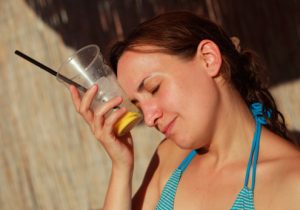
The researchers studied 738 IBD patients and 786 infectious gastroenteritis patients over a five-year period. Their data were compared to other non-infectious chronic intestinal inflammations, as the control. During those five years, 17 heat waves were identified.
Lead author Dr. Christine N. Manser said, “The evidence of patients with IBD having a significant increase risk of flare-ups compared to the control group shows a cause and effect between the climate and the disease. This study ties heat stress to digestive symptoms supporting the observed seasonal variation in the clinical course of inflammatory bowel disease and suggests that microbial infections of the gut might be additionally influenced by climate changes.”
“Heat waves are known to cause physical stress as evident from increased frequencies of other stress-dependent health events such as heart attacks. Physical as well as mental stress has been shown to cause flares of IBD, and may explain the increase in IBD hospital admissions during heat waves. During a heat wave, patients with IBD should be aware that there is an increased risk for a flare and contact their gastroenterologist in cases of an increase of stool frequency or abdominal pain. The public should know that a sudden onset of abdominal pain and diarrhea during or shortly after a heat wave might be symptoms of an infectious gastroenteritis,” Dr. Manswer concluded.
Natural remedies to manage heat waves at home
Get familiar with these five tips for the prevention of heat-related illness, and you’ll know exactly what to do during a heat wave and how to treat heat exhaustion.
- Know your own body:There are some personal factors that can make people more susceptible to heat-related illness. The elderly, young children, and people with chronic disease or mental illness are most at risk during high heat, the CDC reports. Those with conditions like obesity, heart disease, and poor circulation, or people who are taking certain prescription drugs or using drugs or alcohol, are also at higher risk.
- Turn on the AC:Air conditioning is the top prevention factor against illness and death related to heat, according to the CDC. If you have air conditioning, use it at home when needed. If you don’t but need a break from the heat, find a local spot that has it. Many public libraries have air conditioning, for example, and most cities offer cooling centers that people can visit when it’s particularly hot and humid outside.
- Stay hydrated and get wet:Even if you don’t think you’re thirsty, it’s important to take in plenty of fluids when the weather is hot. The CDC recommends drinking more water than usual, at regular intervals – don’t wait until you feel thirsty to guzzle a glass down. If you are working or exercising outside, drink two to four cups of water for each hour you’re out there. And avoid alcohol and sugary liquids, the CDC recommends, as these can be dehydrating.
You can also use water to cool yourself down – take cool showers or baths if you need to get some heat relief.
- Wear sun protection:Apply sunscreen often and properly: use more than you think you need, don’t miss any spots, and re-apply right after swimming or excessive sweating or every two hours. Wearing lightweight clothing that covers your arms and legs also offers some UV protection, as does wearing a hat that covers your face and the back of your neck. And stay in the shade when outside – particularly during the afternoon hours when the sun is at its highest point in the sky.
- Know the warning signs:While prevention is the best strategy, it’s also important to be aware of the symptoms that indicate a heat-related illness, so you can receive medical help right away in the case you get sick.
If you experience symptoms like heavy sweating, weakness, fainting, nausea or vomiting, a fast, weak pulse, or cold, pale, and clammy skin, the CDC recommends moving to a cooler location, lying down, loosening your clothing, applying cool and wet cloths to your body, and sipping water.
If you continue vomiting, seek medical help. And if you experience more serious symptoms like a body temperature above 103F, a rapid and strong pulse, possible unconsciousness, or hot, red, dry, or moist skin, call 911. If you are with another person with these symptoms, call emergency service, then move them to a cooler environment and use cool cloths or a bath to reduce the body temperature, but do not give fluids – wait for help to arrive.